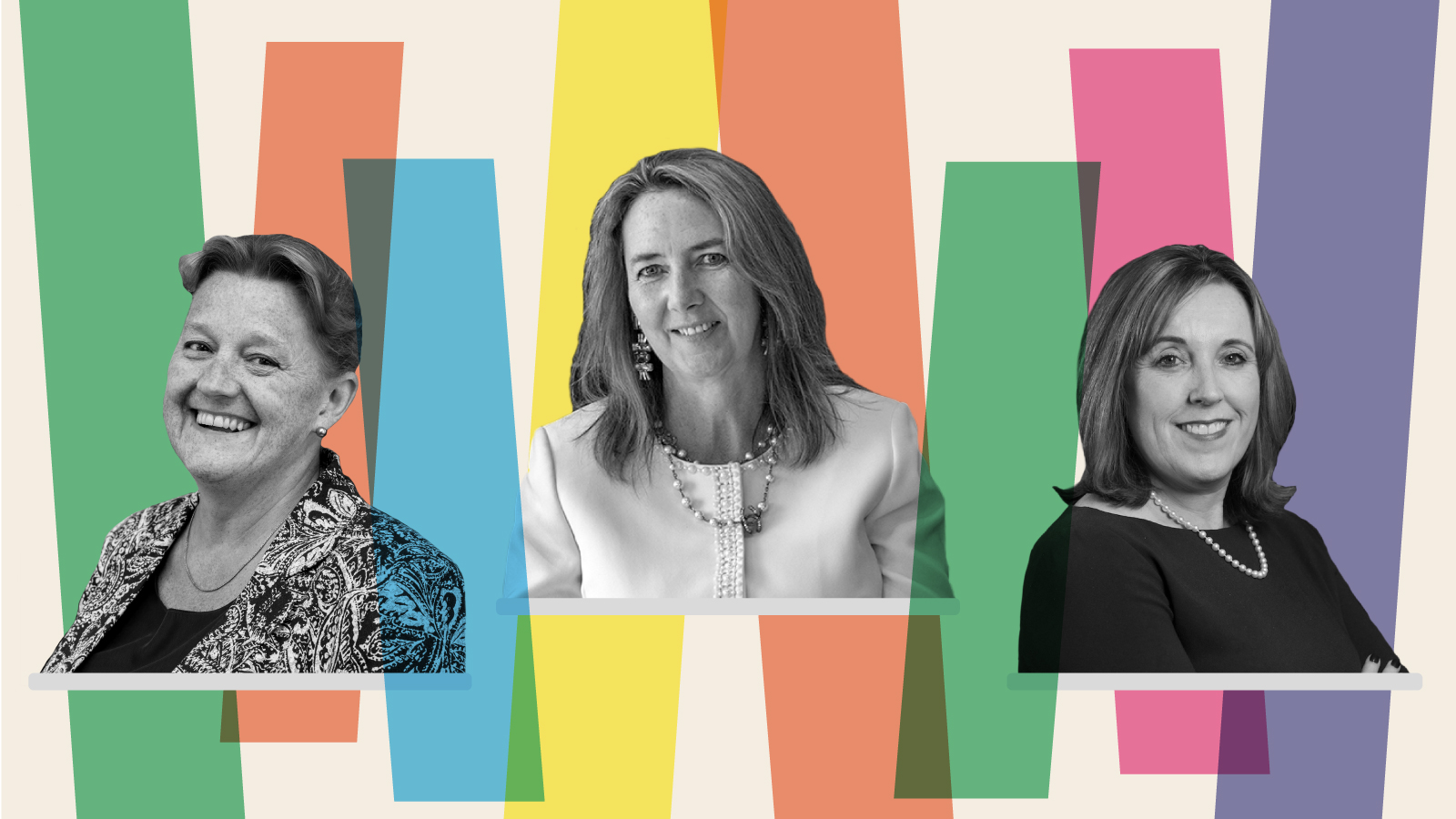
In its 152-year history, RICS has had only three women presidents. Louise Brooke-Smith FRICS, Amanda Clack FRICS and current President, Kath Fontana FRICS, sat down with Modus to talk about their experiences of being female in the property industry, and what needs to change to enable more women to rise to the top.
What was your experience of being a female surveyor at the start of your career?
Amanda: I came into surveying a bit by accident, as a lot of people do. I did a day-release degree, and I never particularly thought about being female in that environment. It was just about just getting on and doing the job, and I never let it hold me back in any way.
When I first started, I was the only woman in the business, so that was quite bizarre. Of course, you're aware of it but it didn't feel like a big issue. At university there were only four women out of the whole surveying class, and when I did my master’s I was the only female, so you get used to it I suppose.
Louise: After I finished my degree I worked in Zaire, now the Democratic Republic of Congo, and India, before coming back to the UK and working for Birmingham City Council. It never struck me that I was one of so few women in this industry. I never came across any prejudice; it was great fun.
When I later set up my own business, it didn’t occur to me that this was a strange thing to do for a woman. It was very successful and, as I grew the staff, it happened that we were predominantly women which worked very well.
Kath: During my first job as an estate manager in local government, I worked with quite a lot of women, and for a woman boss. Local government, even in the 90s, was quite inclusive and there were a lot of women in my field.
Then I went off to work in the supply chain, and everything was very different, with an overwhelmingly male staff. I remember my first day: the desk next to me was empty and I asked who sat there and was told that there was another woman starting and they thought we would both like to sit together. That sort of makes sense, but nowadays we would call it benign sexism. It was people trying to be nice, but in the process making you a bit marginalised.
How far has the role and profile of women come on since then?
Amanda: At the start of my career, there weren’t the role models there before me, or there were very few. I have realised that the role of the RICS President comes with huge opportunities. I understood it was important to be a leader, but I hadn't realised how important it was to be a role model, and that people would look at you and aspire to be like you.
Louise: I think the role of women has come on hugely. When I joined the RICS as a student, 2% of construction and property professionals were female. Now, depending on how you calculate it, it is between 20% and 30%, and the speed of change has been huge over the past five to seven years. There will always be the cohort in our industry who think it's very strange to see women on a building site, but they are absolutely the dinosaurs of our industry, and they are dying out.
Kath: In recent years we have seen many more women in leadership positions and, certainly in the FTSE, there are more women on boards, although they tend to be non-executives. The pipeline of talented women surveyors is growing stronger all the time. For them, I believe that role models are crucial. Seeing Amanda and Louise in the role of RICS President encouraged me to think that I could do this too. I hope that there are many more women in the profession who feel the same sense of inspiration to elevate their ambitions.

"There are still too few women rising up the ranks to be able to get to the top jobs" Louise Brooke-Smith FRICS, Former President
What are the current challenges/obstacles for women in the profession today?
Amanda: We've got to attract more women in, and that's about having multiple women shortlists, more skills-based assessments, and being more inclusive in the way you look for talent. After that, we need to actively encourage people to go for promotion, working out how we tap them on the shoulder and say, look, you should put yourself forward.
Then it's all about retention and development: family-friendly policies, shared parental leave, flexibility. Thanks to the pandemic we have shown we can work flexibly - let's not go back to where we were.
Louise: I think part of it is that in difficult times - pandemics, recessions - it is easy to return to type. There are still too few women rising up the ranks to be able to get to the top jobs, although it is definitely improving. We need to get a strong cohort entering, and for there to be flexibility in working environments to enable them to stay in the industry. If a higher number of women get to middle management there is a far better chance of them reaching top management.
There are upsides to the pandemic as Amanda said, but the downside is that you still have a lot of women who are at the lower echelons and it is easier to put them on furlough or make them redundant.
Kath: If you look at tangible measures of women's progression, for example the gender pay gap, on the whole the pace of change is slow. We should recognise that the fundamental obstacles are not in fact whether women are confident or competent, or whether they are networked or have mentors. The barriers are at business and societal levels.
The critical business-related factor is inclusive recruitment strategies, ensuring that policies and behaviours of organisations are aligned to provide opportunities for women, particularly at a senior level.
Certainly my generation still has a lingering sense of striving to be perfect: perfect home, perfect kids, perfect job. On a societal level I think shared responsibilities around parenting are critical for women to be able to progress in the workplace.
What are you doing to meet/address these challenges?
Amanda: I think we need more role models from different aspects of society who can stand up and tell their stories. If there were one thing I could ask of the readers, it would be please go and tell somebody about what you do, so the message gets out there.
It is more important for our sector to be diverse and inclusive than almost any other. How can we go out and build an environment for communities when we're not representative of the communities we are there to serve?
Louise: It is really important to keep a strong voice. If there is a way of being able to introduce diversity of thinking and of decision-making at board level, that really does make a difference to the way organisations and companies operate. I can see the difference that it is making with the women that I'm working with on the various boards I sit on.
Kath: On a personal level, the most important thing that I do is to make sure that my recruitment is fair. When I recruit a 50:50 shortlist is non-negotiable.
For the industry, we need to celebrate and learn from those organisations that successfully promote women to senior roles. I think there should be an honest stock-take of where we are, and action put in place to do something different. Let’s not do the tried and tested things that are not materially moving the dial for women. We need whole sector commitment to do something new.

"The pipeline of talented women surveyors is growing stronger all the time" Kathleen Fontana FRICS, Current President

